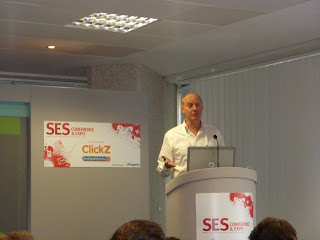Getting Mobilized: Mobile Marketing Strategies #sesuk
 A busy room! Mobile is still the hot! This morning we're moderated by Erica Schmidt of iProspect and our speakers are Jen Brady, the CEO of Fred & Associates and Steve Page, CEO of Mobile Commerce.
A busy room! Mobile is still the hot! This morning we're moderated by Erica Schmidt of iProspect and our speakers are Jen Brady, the CEO of Fred & Associates and Steve Page, CEO of Mobile Commerce.Jen Brady
Let's not forget to look at what customers want. Other pain points: agencies are moving too slowly says Jen. This frustrates customers. Jen also suggests that marketers think mobile is smoke and mirrors. I suspect this view my by influenced by the fact that Jen's from the States as I've not personally encountered that view here in the UK or elsewhere in Europe.
Don't just do a mobile campaign to do it. Make sure it's relevant and make sure it covers the right platforms. Don't forget the BlackBerry.
Jen's found her trip to London interesting because she's not been able to find local restaurants by using her mobile.
Another pain point is the multi-platform demands; iOS, RIM and Android. There are also a lack of standards for the likes of analytics and quality guidance.
How to respond?
The world no longer has borders but consumers have different demands. Geography is still important. Mobile users in Japan are different from those in Scotland.
Publishers are now aggregators of demand. Publishers have been successful at this but marketers are yet to follow.
It's easy to set up mobile when setting up your PPC campaign. It's a missed opportunity if you forget, Jen says.
Steve Page
Tips on going mobile:
- Focus on desktop SEO
- Use paid search for discovery
Steve points out that on different handsets you get different ads but the same natural search results. In fact, in his examples the natural search mobile results match the desktop results. He suggests you might as well concentrate on pure desktop SEO.
Steve pulls up one airline - let's call them Rainbow Duck - that has a site which isn't optimised for mobile. So once it's been found there's very little chance of of anyone being able to use it.
People don't scroll much on mobiles. You need to be at the very top of mobile results to be in the game.
About 5 million searches a day go via Steve's company. They work with some of the mobile networks.
What are the biggest search terms on mobile as tracked by Mobile Commerce. In 2010:
1: Facebook (15% of all searches)
2: Google
3: Bebo
4: Youtube
5: www.facebook.co.uk
6: Ebay
7: Ebuddy
8: www.facebook.com
9: Hotmail
10: MSN
11: Yahoo
12: Lottery
13: You Tube
14: Face Book
15: Flirtomatic
Bebo is that high based on its performance at the start of the year. It drops like a stone afterwards.
Steve ponders why so many people search for Google. I ponder why people try and type in Facebook.co.uk.
Sports are popular. When England are playing people just search for [England]. They don't search for [England football] or [England cricket].
Steve's tried to compare this to Desktop searches. What becomes clear is that some search terms are more likely to appear on mobile. Turns out that only a small percentage are looking for location results. Social networking has about 15% all all searchers. About 45% of all mobile searches are "single user search", ie unique long tail searches.
Local only get about 1% or 1.5% of all searches. Questions arise over searches like [manchester city] - is that a sports search or a local one?
(* Live blogger note: Just seen a tweet that says "Google rep confirms 1 in 5 search queries have local intent. 1 in 3 mobile queries are also local. #SES" via @NickWilsdon. Funny.)
The trend? Single user searches are on the increase.
Which ads get clicked on the most? It's important to keep in mind the low end devices have a very different search experience than the smartphones. 49% of people click on the first ad. 22% click on the second ad in mobile.
In the States only 4% of searches come from a high end device. In the UK 15% come from high end devices.
The CTR of an average mobile ad in the UK is about 3%.
When launching an app it's crucial to appear in the "Featured" section in the AppStore. This is controlled by a team in iTunes. This is where your launch spike of downloads will come. Those downloads will put your app into the top of the category sections.
A rather sneaky way to remind your customers that your app is there - is to release updates. On the iOS this encourages people to re-download/update the app.
The app PositionApp for the iOS will tell you how well your app is doing.
Do you keep your rankings high? Companies like o2Media can help. A SMS campaign can be sent from o2 to help promote your iOS app. The very best way is to feature in one of Apple's own promotions. In other words, when Apple are doing an "app for Christmas" style promotion then it helps hugely if they recommend you!
Free or paid? Free certainly encourages those downloads. Some of Steve's clients have moved budget from development (trying to earn money back from paid apps) to marketing (brand boosting via free downloads).
The final collection of takeaways; Apps are always developed late, buy at least one handset on each OS you want to target (ideally one on each operator!), learn how the OSs work by using other apps in anger and understand what you're trying to achieve. Lastly; think about how the app works when it suddenly looses signal.